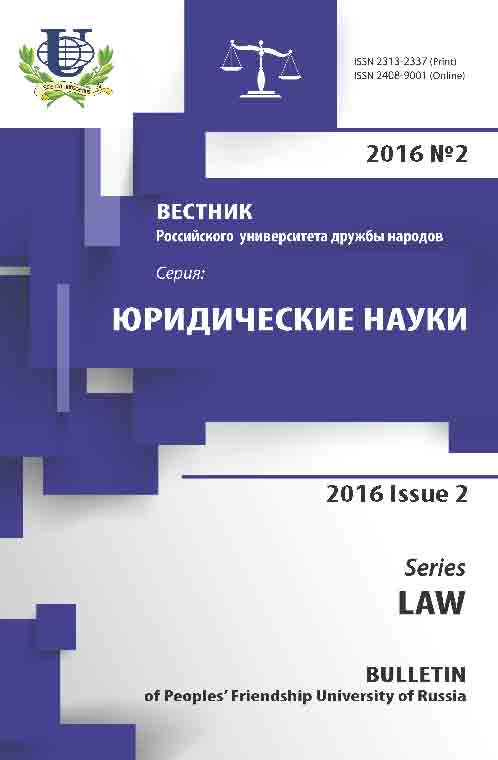The principle of formal equality in the system of principles of the law of international organizations
- Authors: Dorskaya A.A.1
-
Affiliations:
- Herzen State Pedagogical University of Russia
- Issue: No 2 (2016)
- Pages: 62-72
- Section: Articles
- URL: https://journals.rudn.ru/law/article/view/14794
Cite item
Full Text
Abstract
The article considers the correlation of general principles of law, the principles of international law and the principles of aw of international organizations. It is shown that the system of principles of law of international organizations are quite ambivalent, therefore, specialists interprets them in different ways. The principle of formal equality is extremely significant in this regard. Some researchers consider formal equality as essential characteristic of law in general, while others disagree. In the article the principle of formal equality is considered as a basis for the development of the law of international organizations. Such principle as sovereign equality of the states and respect of the rights inherent of sovereignty is analyzed as derivative of the principle of formal equality. In article it’s shown that only from the XX century it’s possible to speak about the principle of formal equality as the principle of the law of the international organizations. Since that time the violation of this principle practically always led to armed conflicts and refusal of the purpose for the sake of which the international organization was created. As an example, the author is illustrated the activity of League of the Nations. The violation of the principle of formal equality led to the fact that the main task of this organization - the prevention of the Second World War - was not solved. It is also considered the acceptable of legal limits of the principle of formal equality in international organizations. It can be the use of informed decision as a result of voting in some international organizations, i.e. the specialized agencies of the United Nations (UN) as the International Bank for Reconstruction and Development (IBRD), the International Monetary Fund (IMF), The International Finance Corporation (IFC), and the International Maritime Satellite Organization Inmarsat. The second acceptable legal limit of the principle of formal equality is the preferred position of the Russian Federation, the USA, The United Kingdom of Great Britain and Northern Ireland, the People's Republic of China (PRC) in the United Nations Security Council. These are the states that played the key role in the defeat of fascism during the Second World War.
Keywords
principles of law, principles of international law, principles of the law of international organizations, principle of formal equality, principle of the sovereign equality of States and respect for the rights inherent in sovereignty, law of international organizations, branch of international law, principle of informed decision, state sovereignty, membership in international organization, UN, League of Nations
About the authors
Aleksandra Andreevna Dorskaya
Herzen State Pedagogical University of Russia
Email: adorskaya@yandex.ru
48, Moika River, Saint-Petersburg, Russia, 191186
References
















